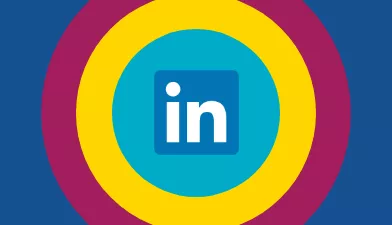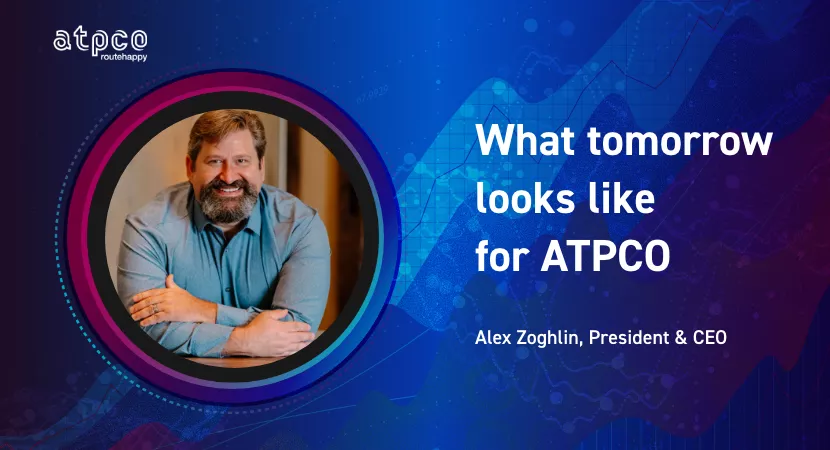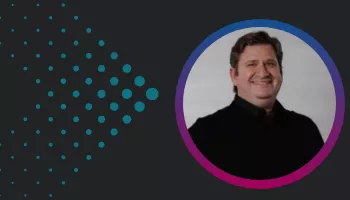On demand | Elevate 2022
Playing to win: ATPCO President and CEO, Alex Zoghlin
INTERVIEW • THOUGHT LEADERSHIP
When Alex took the opportunity to lead ATPCO in January of 2021, he was facing the first pandemic in more than 100 years and the challenges that paralyzed our industry. From the way we ran our business and how we supported customers to the innovation needed to move the industry forward, hear from ATPCO’s CEO on how he learned to play to win.
Maya: So I have to share with my audience, I mean, our audience. I have always aspired to be a talk show hostess, and nobody will give me a talk show. So today I'm going to be Oprah, okay? Will you be Gail?
Alex: I'm Dr. Phil, I guess.
Maya: Okay, all right.
Alex: Maybe Tom Cruise.
Maya: All right, well, let's get started. So many people are curious about your career journey. You've been a serial entrepreneur, but in late 2020 you joined ATPCO as our Chief Executive Officer and we want to know why. We're happy, but we'd like to know why. Why don't you explain that?
Alex: I ask myself that question every day, you know. No, no, no. In all seriousness, two things. The first is I love this industry. It's, I think for everybody in the audience, if you've been in and when I say this industry, I don't mean travel, I mean the airline industry specifically.
You know my very first company literally out of college, we had major airlines and Travelocity as customers. Obviously I was the first person that Orbitz Travel Agency and the G2. So it gets in you, it becomes a part of you. So, there's that.
The other is, I don't know quite how to say this, but, I joined a company called VHT as the CEO in 2009, Exactly when―it was a real estate marketing company―exactly when the entire real estate market in the United States collapsed in 2009, I joined as the CEO. And what you learn is, in times of change like that, that is when people start to think there might be other ways of doing this. I have to try something different because the ways I've been historically doing it are not working anymore because the system isn't working anymore. So coming in in the middle of COVID was a really good and interesting time to come because things are going to change. They have to change. And in fact, in the real estate industry, by the time we left, there's no consumers who buy real estate the way they used to. It used to be, you go to a real estate agent and they are the connection to the MLS and they show you the houses. And now you still might use a real estate agent, but you have been on Zillow probably for two months before you've ever talked to a real estate agent. So you know the market, you know what you're looking for you. You know what the price points are. Fundamentally, 2009, that was the demarcation of a top fundamental rethinking and change of behavior. So it almost feels like I'm coming into it again and we're kind of at that precipice again, which is just a super exciting thing to be in.
Maya: That it is. And what I didn't know, you shared yesterday that your exposure to travel started very young with your mom owning a travel agency. I didn't realize that until you told that story yesterday.
So once you joined, what would you say were your top priorities for the company, for our employees, for our customers, for our partners?
Alex: Well, obviously, so January, I became the CEO and I think for, this is probably for most people, your number one priority is we need to make sure that our people were safe, that things are okay. Number two where our customers are okay and we're continuing to do the right things for them. You know, we were in an incredibly uncertain time and I think by then it had lasted significantly longer than anybody anticipated. In fact, it started to look like it was going back into the Dark Ages again, given the resurgence of COVID in the winter. So those are kind of priorities, number one. You don't, you almost don't even have time to think about the big stuff because the here and now becomes the most important.
Maya: I remember thinking when we first went home, it'd be two weeks.
Alex: Yeah, right, right, right. Everybody thought that.
Maya: And here we are still in it.
Alex: Yeah, actually our CFO tells a funny but sad story in which we at ATPCO actually, in March of 2020 when it just started, they signed a very big expensive lease with WeWork, thinking oh, it's just going to be a couple of weeks that everyone's going to be back at the office. And then a year later we're paying WeWork.
Maya: Right.
Alex: Whole lot of facilities we aren't using. So, yeah, that was that was the common belief for most folks.
Maya: Have you been surprised with the pace of recovery of the airline industry?
Alex: Yes and no. Again, we're, I'm talking to an industry that has been here a long time. Travel, for a certain part of the population is a primal urge. And when you suppress it artificially, like what happened in COVID, it shouldn't have been a surprise to anybody that when it opened up, people were going to take advantage of it. Because you can only sit in your basement for so long before it's time to get out. And I think as we witnessed it at Elevate this year, that that human connection and human interaction is hard to replace. Zoom is good, but it's not a replacement for it. So, no, I was not surprised at the volume of the demand. I think I probably didn't appreciate the operational complexities of literally shutting down an industry and bringing it back up. That is just significantly more complex than anybody anticipated.
Maya: Than anybody could have anticipated or imagined. No, you're right. So when the pandemic hit, ATPCO is proud to have created some few innovative solutions. Can you talk a little about that?
Alex: I guess I should say that that preceded me. So this is again this is ATPCO DNA. It's not Alex. The company sprang into action with that. They had acquired Routehappy by then and instantly they started to provide both structural UPAs and reassurance UPAs. We had over 300 airlines that we made reassurance UPAs for, everybody in our Community Participation. We provided basic reassurance UPAs. We provided structured UPAs pro bono, basically for everybody for free, so that the public would know and understand what the new rules were. In fact, in some areas like exchange rules and things like that, we even did the language conversion, I think, 6 or 7 languages for all of the airlines to make sure that the new rules and the new normal became understood for everybody. So that there wasn't confusion in the traveling public. Again, that's one of the advantages of having a utility like ATPCO in the center that that's really here for the industry, not just here for itself.
Maya: Can you explain some of the innovations that we're focused on now to help elevate the industry?
Alex: Yeah, I think we talked about some of them the last few days, if you take our intro where we're talking about new proof of concepts, you know we provided that first. We'll call it the airline maturity index where we're actually taking real data of what airlines are doing. I think that you're going to see ATPCO do a couple new things.
One is I believe that we as ATPCO have to do a better job of helping airlines get through the maturity model of what's already capable in the industry today, so that when new things become ready that they are ready as an organization to take advantage of that. So us doubling down in our own products and services to make it easier, to make it simpler for airlines to take advantage of more sophisticated capability within the ecosystem that already exists.
The second is helping the ecosystem that doesn't quite exist yet evolve and evolve in a way that, and this is a core ATPCO belief, we believe that there has to be some interoperability because there will be many airlines that are going to live in both worlds for longer than anybody wants. So we need to make sure that these two things can stand together. And the second is, ATPCO I think historically has, when we did something new, we got broad and general agreement from everybody before we started, and then when we started, it became a Manhattan like project in which we built from scratch. What we're trying to do with some of these proof of concepts now is, let's do some trials, let's do some minimum viable products. Let's see if this has value to the industry before we make the massive investment of infrastructure required because there are many paths to the future that we're talking to. I as Alex and we as ATPCO, we don't pretend that we have the answer, but we think that we can be part of the answer. So you're going to see more of these proof of concepts, you're going to see more of these design groups in which we collaborate and maybe we stand something up and see if this is going to work as the way and sometimes it might not.
This is also new ATPCO. We might shut some things down if we think it's not going to help us get to where we need to be. I don't think, I know, within ATPCO when we pivoted the NDC product. That was, I'll just say, that was a tectonic shift for the company inside the organization because once we have ever gone public with a particular product, we don't ever kill it. It never ceases to exist. That is, that's something that the company has not, has not ever done. So when we start to do these things I think we have to be more transparent about is, is this a proof of concept or is this actually something real, and be clear with customers about what it is we're asking them to participate in going forward. When you think about leading a company, where we want to bring more value to the industry.
Maya: Thinking about your career, what would you say was the most important lesson or experience you've had that prepared you to lead this company? I want to know why you qualify.
Alex: I'll give you two answers. The first one is, I remember back in my days at Orbitz, when we were working with ITA, literally everybody told us what you are trying to do, we want to actually compute every single possibility, we want to create a matrix display for everybody. Everybody said this is not possible, it's not going to work, availability is going to... and the willingness to go into the light in, which I mean I'm looking in the back, I can't see the back at all, but I know it's there. So being willing to take that step forward into the light when the clarity of the path isn't there, but the value of the end is really important. That's something I've done for most of my life. Now, I'll say in my younger days, I did it with my head down, just banging into walls. And it works in some ways, but it creates a lot of chaos, yeah, and issues for me and my issues for everybody. So I've gotten probably a little bit better at that. And actually I'd say my time, I said this at the last, my time at Hyatt. I was executive vice president there and the average tenure at that level, we were just the direct reports of the CEO, was 37 years. So you had an incredibly strong culture. It was a family owned business until recently. How do you navigate inside of something that has such power but still try and bring something new and marry those things together? If you could do that successfully, you can actually create something great. So my goal of ATPCO is not to kill ATPCO. I think there are some people that have a misconception there, is to bring all of what is great with ATPCO with all of what is great with the possibilities in the future and fuse those things together in a way that helps everybody.
Maya: It's awesome. And it goes to segue to my next question. So “pivot” is a buzzword that has been overused for the last few years in our industry and literally around the world. What advice would you give our audience today about keeping the keeping the ship steady as the industry continues to navigate this recovery?
Alex: Well, I'd be careful about that word “steady.” The problem with keeping things steady is then everything's okay and you don't have to change.
Maya: What word would you prefer to use?
Alex: Uh, that's a good question. The way I like to think about it is, people don't always see the light, but they do feel the heat. So you need a little bit of unsteadiness there, because that's what gets people to really drive to the next phase of the next capability. So within ATPCO, I'll tell you some inside baseball things. We have a set of KPIs with our board. We didn't say it but we threw up these long term goals, 80% dynamic, and more than one of you last night said, no way, that's not going to happen. I will tell you that one of our KPIs with our board includes those LRPs. And if we don't hit those milestones, my bonus is at stake. So we're kind of putting our money where our mouth is here. Because if we keep it steady, if we can just say those things, but there's no consequences if we don't get there, we're never going to do the work required to really help the industry going forward.
Maya: How confident are you in the resilience of the flying public?
Alex: Oh, the flying public? They can't be denied. I've learned that through those of us that were around all even all the way back to 9/11. I mean, if you remember when the entire airspace of the country was shut down and people were afraid to travel. It took a little while, but it was short. Shorter than I thought it was going to be. People, again, it's this primal urge. People want to travel, they want to see each other. They want new experiences. And in some ways the next generation, this is even more true. Experiences are starting to become more important than physical products and ownership, so they'd rather spend money on a spring vacation than they would on buying a car. So from that perspective, we're in a really good place.
Maya: I know you don't have a crystal ball, but what would your prediction be in the next 12 months? What would this look like?
Alex: No, I don't have a crystal...I I'm not even sure I know what I want for dinner, let alone what's going to happen. Again, if I put my ATPCO hat on, it is how can we help? We still have 125 airlines that are in that lower left hand part of that quadrant. How can we really help them go forward and those 11 airlines that are already doing dynamic pricing, they're doing adjustments off of what they file from ATPCO today, how can we continue to help them do trials? In ways that allow them to really gain experience, but not require them to rebuild every single piece of infrastructure in their portfolio to even start a trial. So how could we get the best without having to do everything? When you think about the industry over the next 12 months and what we need to achieve, what would you identify as the greatest barriers?
Well, this is true of every organization. It's true of ATPCO too, and it's something that's hard. It's even hard for me, which is when you're doing something new. You just can't add it to the pile of the things that you're doing. You have to stop some things. So the question is, what do you stop doing so that you can start doing something new, and the second you stop doing something. for the folks that have been doing it a long time, that it's like, are you telling me what I'm what I've been doing for 10 years is not valuable? It's like, no, no, no, that's not what I'm saying at all. We're actually just saying something else is more valuable. So having a willingness to say, we need to stop doing something so we can start doing other things becomes incredibly important because you just can't keep adding and thinking that it's all going to work. It's not.
Maya: And so being intentional with prioritization exercises...
Alex: That's right.
Maya: ...to make these decisions.
Alex: It's not just a prioritization, there's actually exercises like Start Stop exercises, which is okay, let's identify what we really need to do. Here's all the things we're doing. What is it that we need to stop? And sometimes it doesn't mean stopping; it might mean that you stop doing it because you have the experience and knowledge to be able to do this. So maybe that means outsourcing, maybe that means automating, maybe that brings it to a third party or handing it off to a different group. Stopping can mean a lot of things, but that intentional stopping is really required in order to put something new on your plate.
Maya: And speaking of intentionally stopping, we gotta stop. All right. Thank you, Alex for sharing all your insights.
An event experience you can't miss
ATPCO's Elevate + ARC's TravelConnect
Speakers
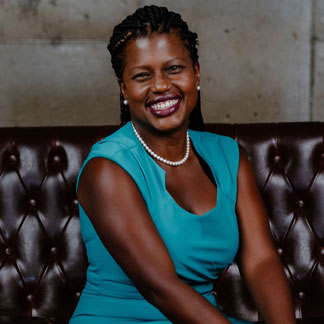
Maya Bordeaux
Chief People & Culture Officer, ATPCO
Maya Bordeaux is a progressive, results-driven executive. In her new role as CPCO, she identifies opportunities to enhance the experience of all employees by expanding ATPCO’s culture and promoting a more diverse, equitable, and engaged workforce that drives innovation and teamwork. Maya has served in several senior human resources leadership roles, including at McDonald’s Corporation, where she developed and led the implementation of employee programs for its 90,000 U.S. employees. Bordeaux also served in executive roles at Wilton Brands and Tribune Publishing, a media company with more than 4,000 employees across major national newspapers including the Chicago Tribune and The Baltimore Sun.
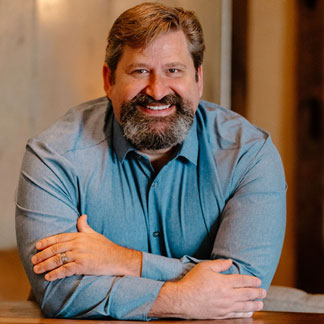
Alex Zoghlin
President and CEO, ATPCO
A lifelong entrepreneur and innovator, Alex brings more than 25 years of knowledge and experience in technology, airline distribution, and travel to ATPCO. He founded six startups, including Orbitz and G2Switchworks, before serving as Executive Vice President, Global Head of Strategy, Innovation, and Technology at Hyatt Hotels Corporation. He brings his business acumen and experiences from the hospitality world to concepts the airline industry can use, such as addressing digital booking flows, digital display, unstructured datasets, and dynamic pricing. When not working, Alex enjoys spending time with his wife and four daughters, making music, building rockets, and learning new things.
You might also like
